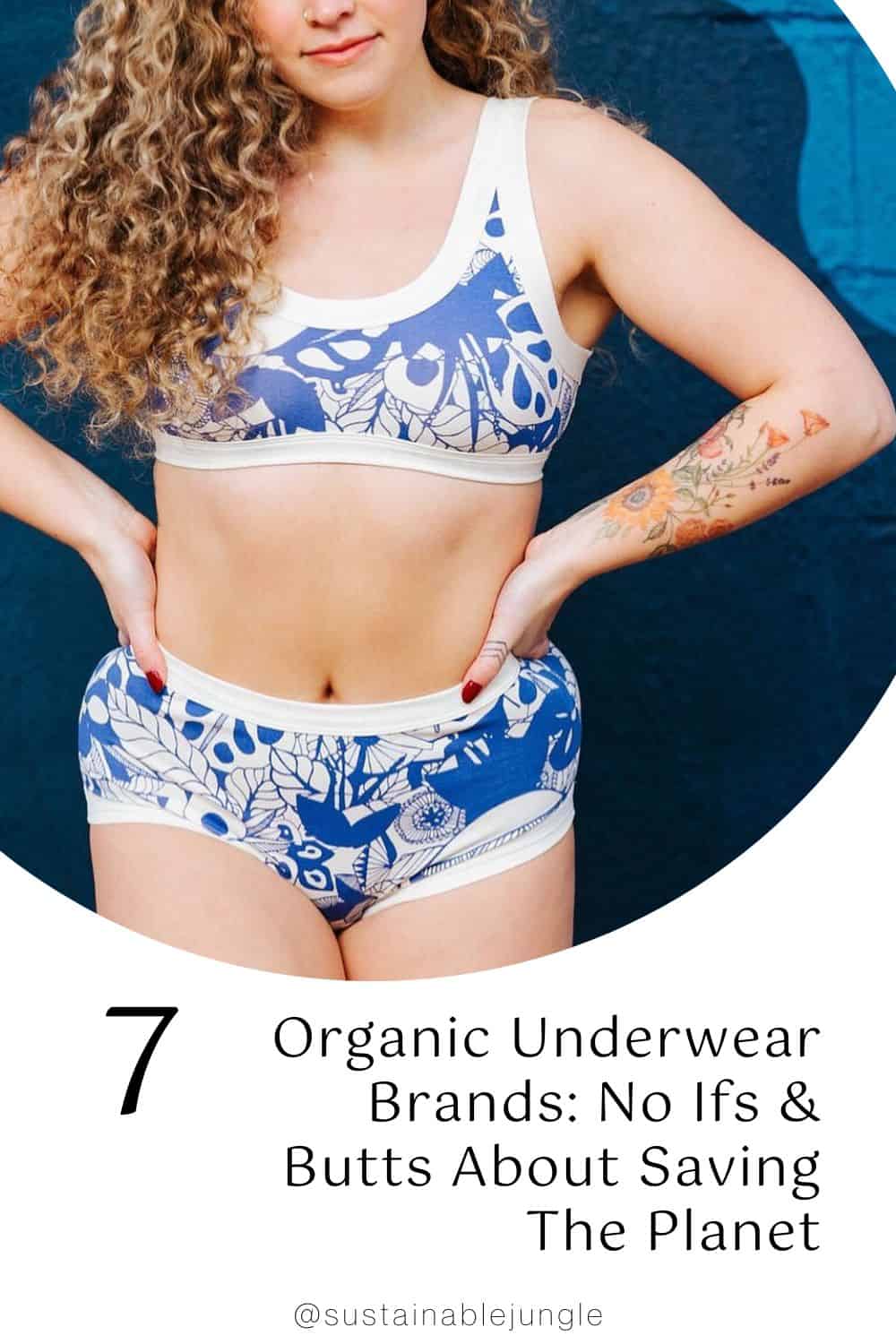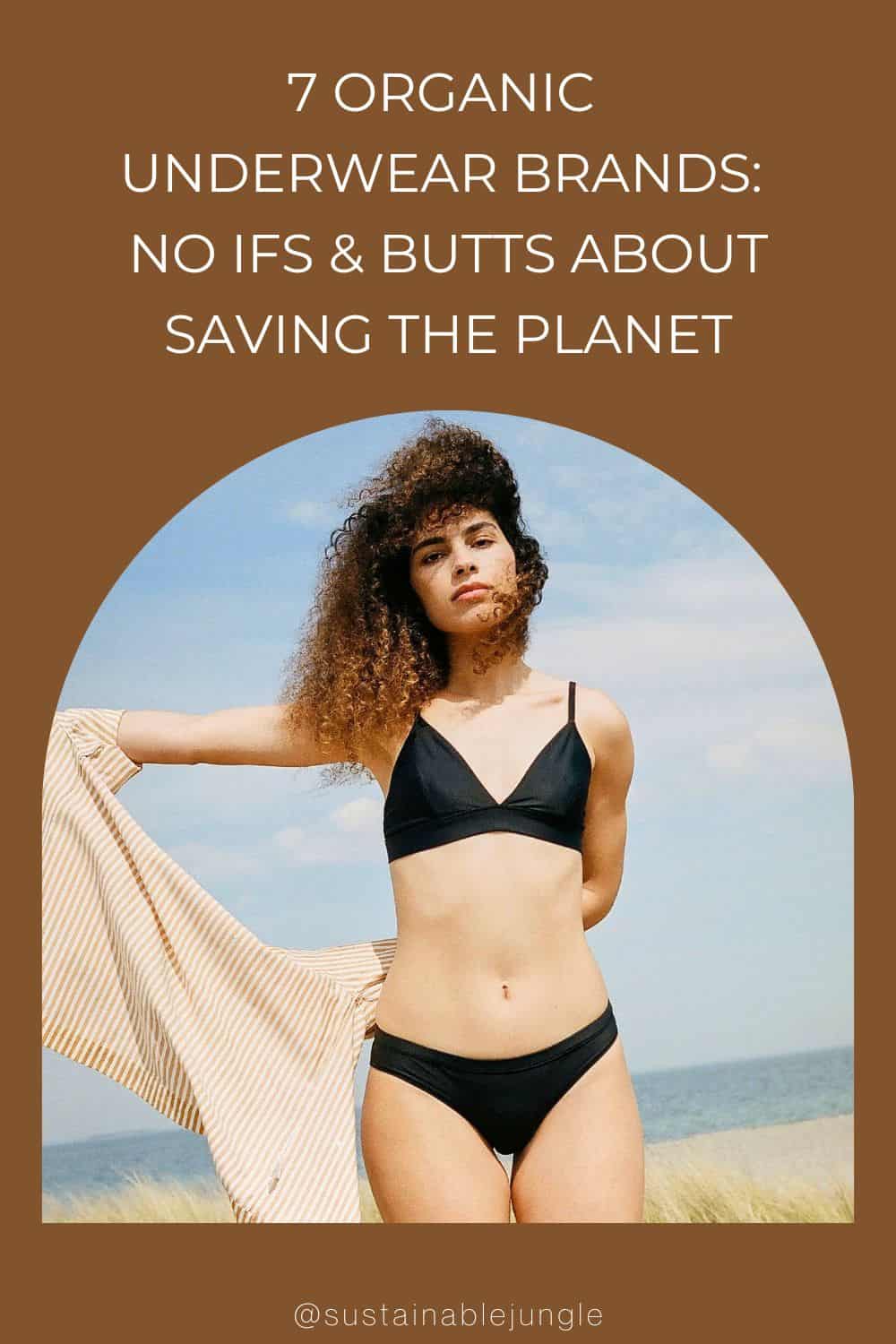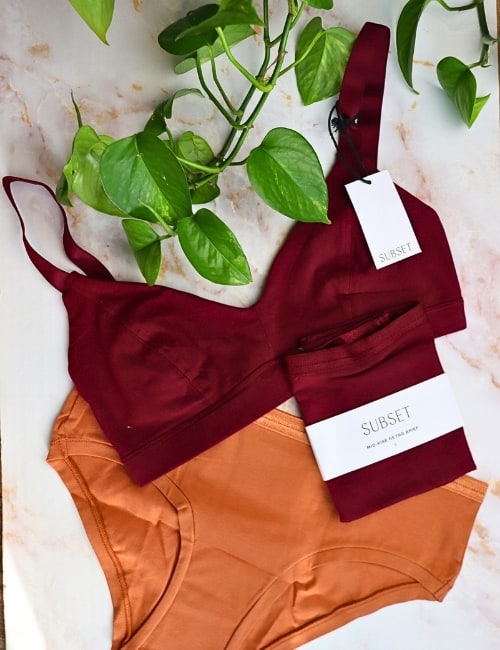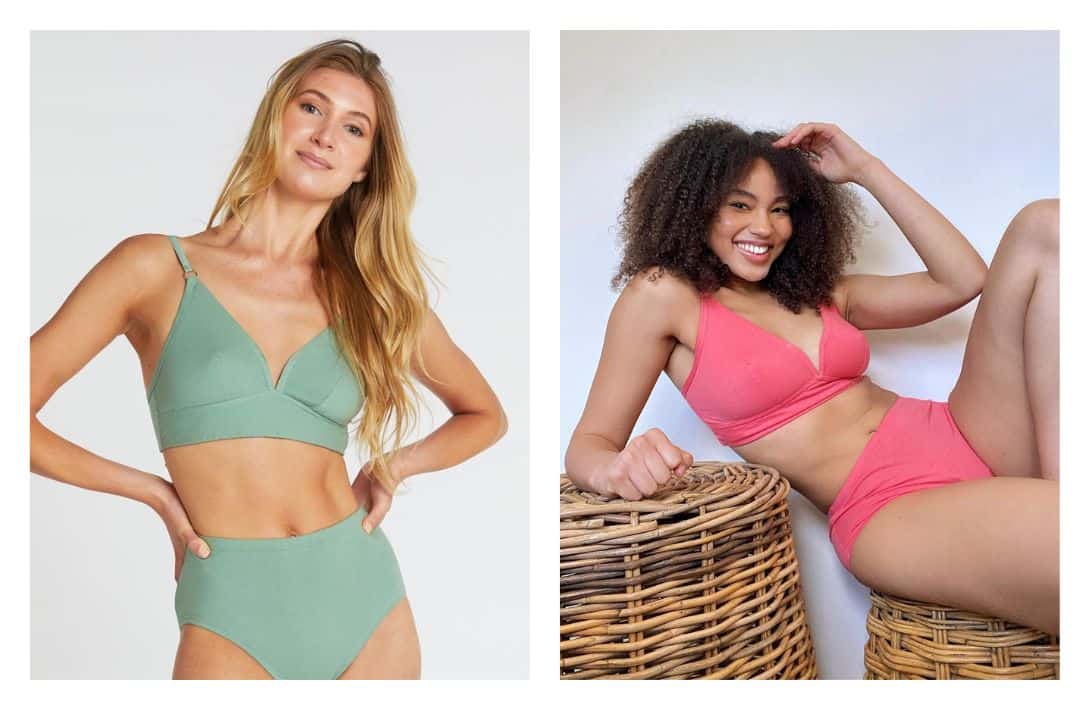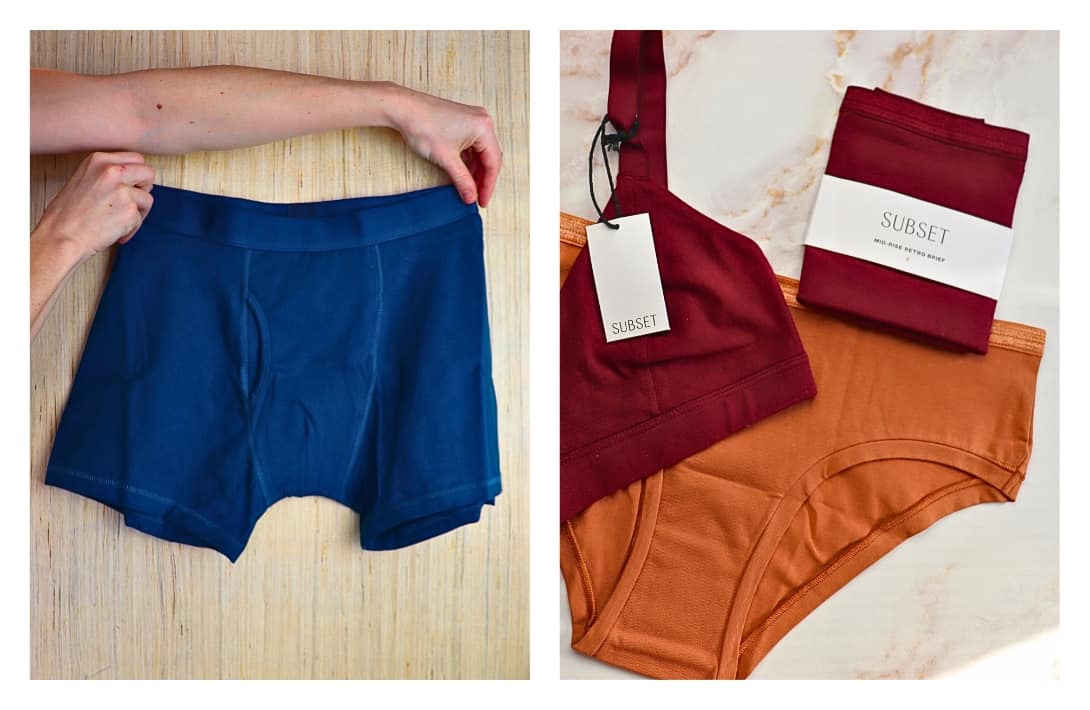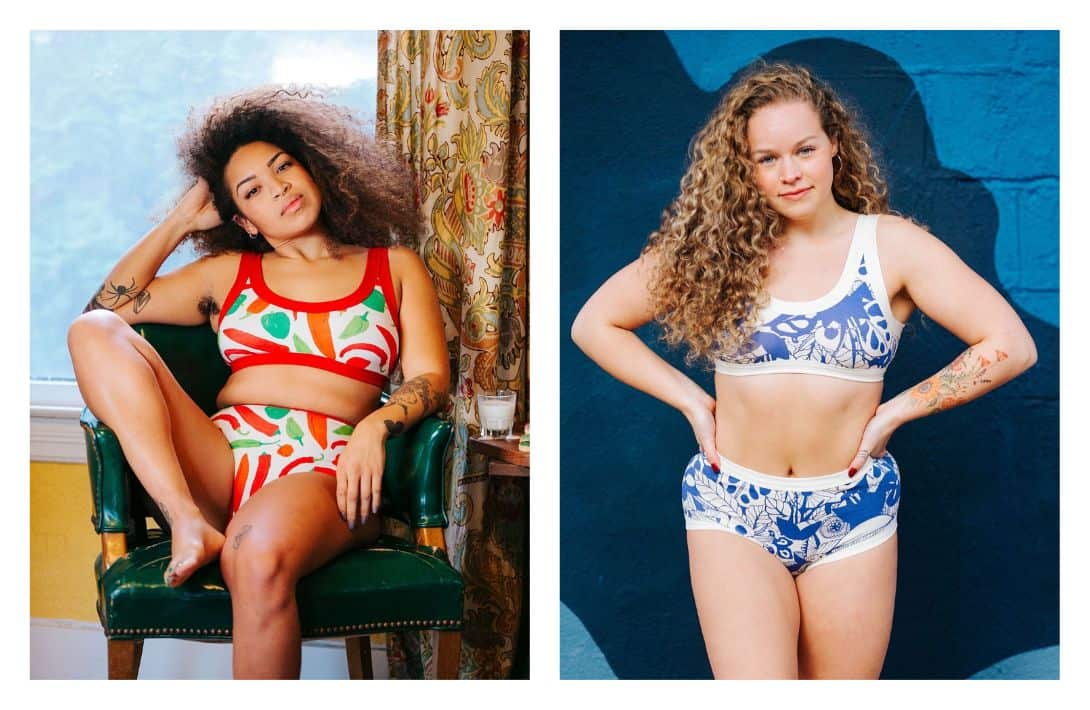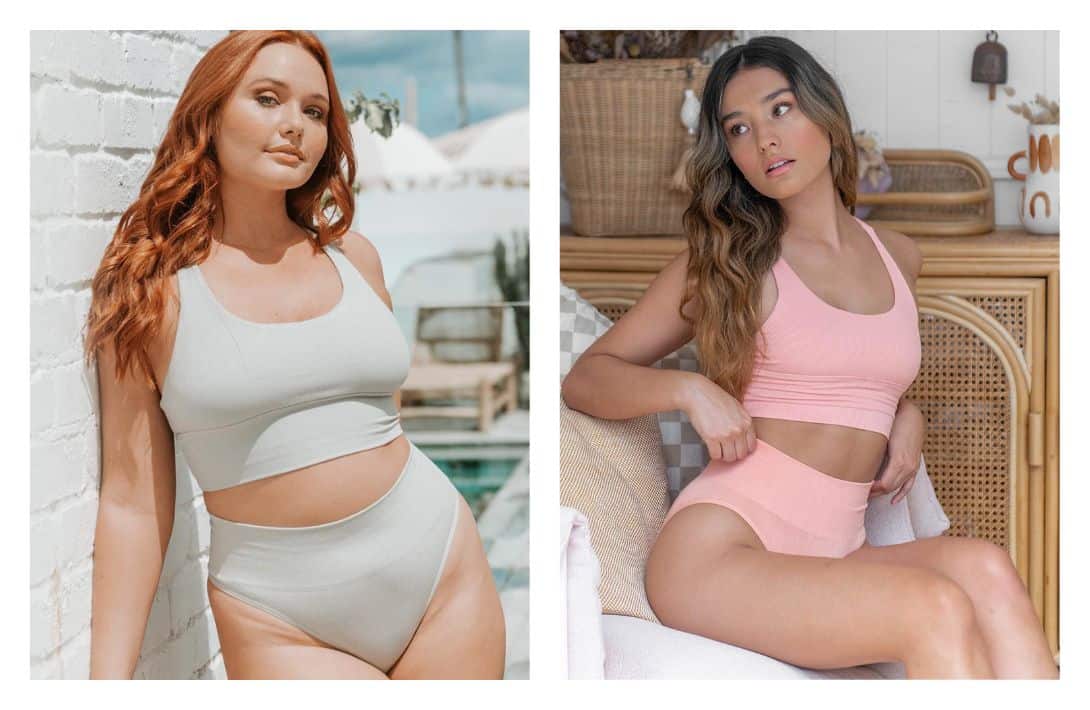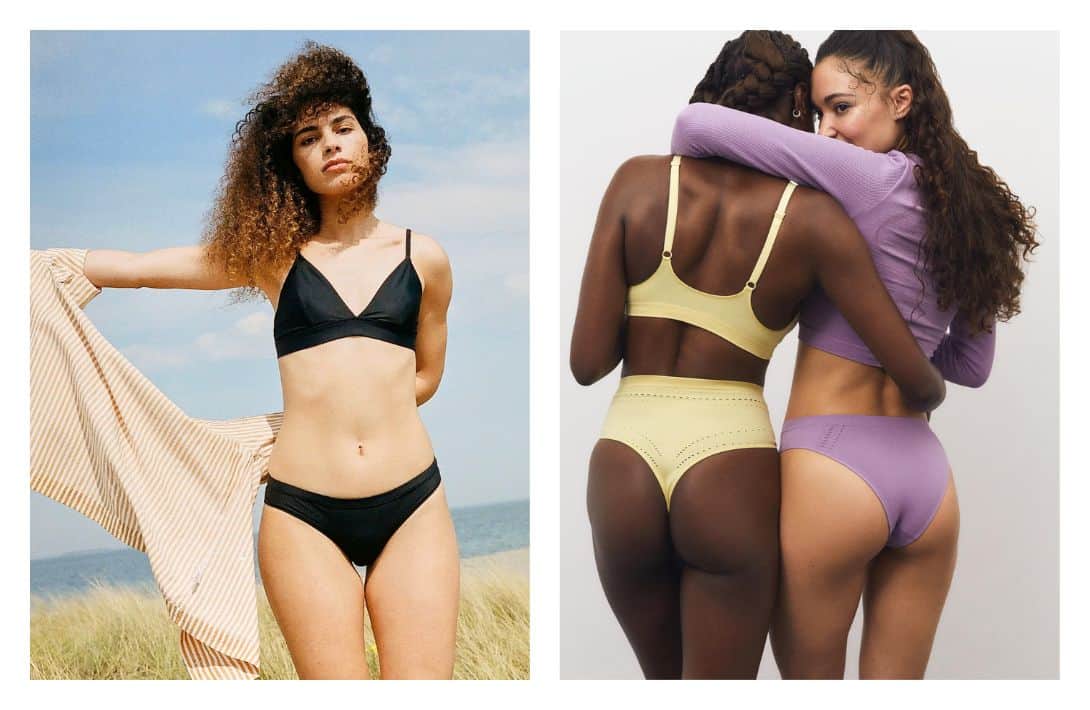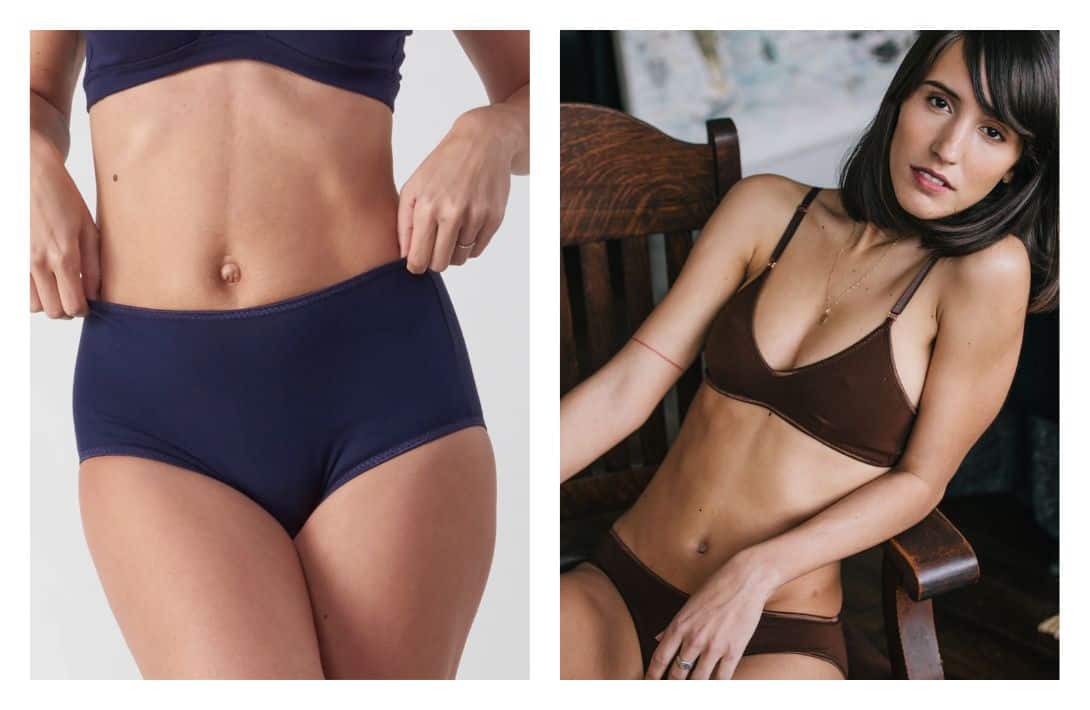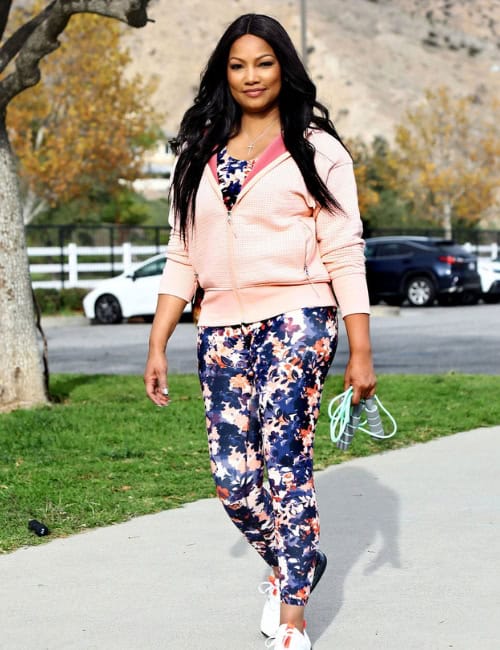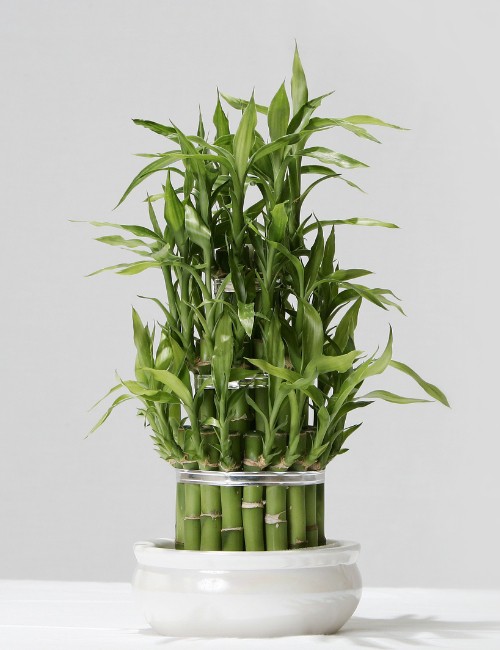7 Organic Underwear Brands: No Ifs & Butts About Saving The Planet
Looking for au naturel underwear?
Don’t get your panties in a bunch—here’s a brief (pun intended) list of the best organic underwear brands.
What’s covering your bum is probably the last thing on your mind, but what’s “down there” deserves attention for several reasons.
Reasons include health problems, pollution, and worker hazards.
The underwear scene has seen improvements in recent years, thanks to the world of ethical underwear. While many brands are doing fine for your fanny, the best underwear is underwear that’s, well…natural!
Hence our narrow focus is on only organic underwear.
Everything we recommend to you on Sustainable Jungle is independently researched and we ask all brands to confirm their claims. To avoid waste, we test products on an as needed basis. This post contains affiliate links. If you buy something through our links, we may earn a small commission. Learn more about why we do this here.
The Top Organic Underwear Brands For Maximum Skivvy Sustainability
As the name suggests, The Very Good Bra makes very good bras (and underwear without elastic, of course) from compostable, 100% organic cotton, TENCEL™ thread, and neutral tree rubber.
Subset’s affordable, sustainable natural cotton underwear catalog doesn’t contain synthetic fabrics or harsh chemicals.
Brief, boy cut, thong, or boxer—whatever your style, you’ll find a planet-friendly pair in the list below.
Take a peek at our criteria for organic panties at the end of the article.
The Full List Of Organic Pantie Brands
- The Very Good Bra | Visit Store
- JulieMay | Visit Store
- Subset | Visit Store
- Thunderpants | Visit Store
- Nat’v Basics | Visit Store
- Organic Basics | Visit Store
- Brook There | Visit Store
1. The Very Good Bra
About The Very Good Bra
Price Range: $40–$99
With a name like The Very Good Bra, do we need to say anything at all?
Driven by her win against breast cancer, Stephanie Devine started the brand to create the world’s first zero waste bra.
She went above and beyond, creating that along with 100% organic cotton underwear briefs that will completely break down in a worm farm after just eight weeks.
The Very Good Bra’s Ethical & Sustainability Practices
Materials:
The natural fiber underwear and bras don’t contain any polyester thread, nylon labels, synthetic elastic, or spandex/elastane.
Instead, they use 100% organically-grown cotton for the outer and liner, and Lenzing TENCEL™ thread. TVGB uses natural tree rubber instead of traditional spandex/elastane.
Everything can break down without a trace, including custom-designed hooks and eyepieces, GOTS-certified dyes, and soy ink labels.
Supply chain & labor practices:
Materials for TVGB’s 100% organic cotton panties are sourced from many locations, like Australia, Germany, Portugal, Italy, and the Netherlands.
Some of their partners are WRAP and SEDEX-certified, ensuring employees receive more than the local minimum wage, free healthcare, transport, and subsidized meals.
Carbon commitments & green practices:
The Very Good Bra is a Certified B Corp, ensuring they adhere to the highest standards for positive social and environmental impact.
Some items are funded from presales to minimize textile waste, and they use low-energy sewing machines and lights to reduce energy consumption in their facilities.
Besides compostable organic cotton underwear packs, all products are shipped in compostable or recycled recyclable materials.
Australian residents are in luck, as they can select the country’s first carbon-neutral courier at checkout, Sendle.
Inclusivity:
These organic cotton panties’ women’s sizes range between 8/XS to 16/XL.
If you’re unsure which size to pick, consult the Virtual Bra Fitter for a 10-minute Zoom call.
Community & charitable giving:
The Very Good Bra makes contributions to several organizations, and customers can select one of three charities at checkout, to which TVGB will donate $1 on their behalf.
2. JulieMay
About JulieMay
Price Range: $31–$91
The multi-award-winning, UK-based sustainable lingerie and basics brand JulieMay serves up sustainably sexy women’s organic cotton underwear in style.
We’re fans of their latex-free women’s underwear AND elastic-free underwear like the Champagne Brief.
Whether you’re after stylish natural panties, low-rise thongs, everyday bralettes, non-wired sustainable bras, or sports bras, you’ll find high-quality, breathable styles that suit your tastes.
JulieMay’s Ethical & Sustainability Practices
Materials:
The sustainable cotton underwear are crafted from GOTS-certified organic Pima Cotton and silk.
The Pima cotton gives the undergarments a comfortable, durable design, while the silk layer next to the skin provides antibacterial and hypoallergenic properties—earning this natural underwear certification by Allergy UK for even the most sensitive skins.
All the trims, lace, and threads are cotton. None of the pieces contain synthetics, latex, plastic hooks, or stitched labels, and zero toxic chemicals are used during the washing or dyeing.
Supply chain & labor practices:
JulieMay produces all of its organic cotton women’s undergarments in production sites certified by ISO 9001, ISO 14001, and OHSAS 18001.
They ensure each site provides living wages, fair treatment, and high-quality working conditions.
Carbon commitments & green practices:
The brand uses small vats to reduce water usage during the dyeing process and ships all its non-toxic underwear and bras in recycled paper packaging.
Inclusivity:
JulieMay is one of the most inclusive organic cotton underwear brands, with a diverse group of models of all ages, races, shapes, and sizes.
They offer over 30 bra sizes ranging from 32B–40G, with custom-made sizes available and in the latex free underwear, women’s sizes run UK sizes 8-18.
Community & charitable giving:
JulieMay is partnered with Greenspark, supporting several environmental and social projects, like the Eden Reforestation Projects and Plastic Bank Recycling.
3. Subset
About Subset
Price Range: $17–$48
Subset believes standards were made to be raised and proves the point with their range of some of the best cotton underwear to grace your glutes.
They’re designed to help the 300 million around the globe who suffer from bladder, yeast, and vaginal infections every year.
This ethical underwear brand is doing so by replacing chemical synthetic fabrics that don’t breathe with GOTS-certified organic cotton undies—” so you and your lady parts can breathe easy.”
Subset’s Ethical & Sustainability Practices
Materials:
Say “bu(tt) bye” to petroleum-based fabrics and pesticides and “hello” to getting dressed in certified organically-grown cotton and OEKO-TEX dyes.
Some pieces, like the Mid-Rise organic cotton bikini underwear, contain a teeny tiny amount of blended elastane (5%) for stretch.
Supply chain & labor practices:
Subset will make you blush with how transparent they are (or maybe it’s just all this talk about bums).
The Subset HQ is based in Chelsea, NYC, but the rest of the magic happens in India, where they use third-party certifications to ensure their partners have the same values.
They work with an organic farm located in Ahmedabad, an organic ginner/spinner in Tamil Nadu, and an organic fair trade factory also in Tamil Nadu.
Safe and healthy working conditions, living wages, reasonable hours, and the right to unionize are standard along each step of your Subset knickers’ journey.
Carbon commitments & green practices:
Subset incorporates processes to reduce water usage and safely recycle it on their farms and factories.
Through the Recycling Program, customers can send old intimates for repurposing into new materials, like mattress batting and insulation.
They ship all pieces in SFI-certified, plastic-free, recycled content.
Inclusivity:
For all organic underwear, women can find sizes XXS through XXXL (and they offer plus-size lingerie, too), and a range of models represent each size.
4. Thunderpants
About Thunderpants
Price Range: $20–$42
Thunderpants has made a storm with some of the best non-toxic underwear available.
The family-owned business keeps it stylish with underwear that should be called overwear—AKA it’s so cute you’ll want to be like Superman and wear it on the outside.
They also offer a line of organic cotton kids’ underwear with soft, cute designs.
While Thunderpants was founded in New Zealand, they now have a US-based factory for those seeking organic cotton underwear made in the USA.
Thunderpants’ Ethical & Sustainability Practices
Materials:
Your bits will be sustainably covered in fair trade and GOTS-certified organic cotton dyed with non-toxic and sustainable dyes.
It’s blended with 10% spandex to give it a soft, stretchy feel and help these mostly organic undies not to ride up or roll down.
Supply chain & labor practices:
Garments are produced in a Portland, OR factory only seven miles from their main office. The factory shares Thunderpants’ values of ethical manufacturing, and Thunderpants visits regularly.
The New Zealand branch is just as committed to ethical manufacturing. They print their fabric in Auckland or at their headquarters in Martinborough before the organic undies are sewn in Carterton.
All cotton is grown in India.
Carbon commitments & green practices:
In addition to buying in bulk to minimize shipping emissions, Thunderpants is conscious about composting and/or repurposing any fabric offcuts.
All organic panties ship in recyclable packaging.
Inclusivity:
They use a diverse range of models and offer unisex sizes to fit anybody (S-3XL for women and S-XL for organic cotton men’s underwear).
Community & charitable giving:
Thunderpants has donated to several social justice oriented organizations like the Black Resilience Fund, the NAACP, and the Mitakuye Foundation.
5. Nat’v Basics
About Nat’v Basics
Price Range:$14–$92
Australia’s Nat’v Basics has some of the best organic cotton panties women can confidently and comfortably don every single day.
Whether you’re looking for organic high-waist underwear with full coverage, crop tops made with GOTS organic cotton, or cheeky g-strings & bodysuits with organic gussets, you’ll find seamless designs with breathability in mind.
Nat’v Basics’ Ethical & Sustainability Practices
Materials:
Nat’v uses sustainable materials like GOTS-certified cotton and recycled materials like polyamide and nylon.
While the exterior isn’t organic, any synthetics are always paired with a 100% organic cotton gusset.
Styles like the vegan ChiChi Brief are made from TENCEL™ modal fabric from sustainably grown birch trees.
For those wondering, “What are the safest panties to wear?”, Nat’v’s organic women’s underwear feature non-toxic dyes and bear OEKO-TEX certification, ensuring toxic chemicals don’t end up where they don’t belong.
Supply chain & labor practices:
Nat’v sources modal from Austria, where it’s produced in Fair Trade and ISO 9001, ISO 14001, and OHSAS 18001-certified factories.
Their independently audited BSCI factory is in Jiaxing, China, where workers are paid 24% more than the legal minimum wage.
Carbon commitments & green practices:
Whether you order organic cotton briefs, crops, or a bodysuit with organic cotton gusset, it will come shipped in FSC-certified compostable materials with soy-based inks.
Nat’v also incorporates battery-powered forklifts, compost bins, natural lighting, and LED lights to save energy and waste in its factories.
Inclusivity:
In organic cotton underwear, women can shop S–XXXL sizes.
Community & charitable giving:
Nat’v have partnered with many charities and organizations since launching four years ago, such as One Tree Planted and OzHarvest.
6. Organic Basics
About Organic Basics
Price Range: $20–$203
As their name suggests, Organic Basics is one of the best sustainable basics brands.
The Danish organic clothing company is improving the fashion industry with the help of organic fibers in their range of socks, tees, and 100% organic cotton panties.
At their inception, they specialized in just one item: organic men’s underwear, like the Rib-Flex Boxers, made from soft, vegan-friendly, pure GOTS cotton.
Now you can shop both women’s and men’s organic cotton underwear in a variety of styles and pack sizes.
Organic Basics’ Ethical & Sustainability Practices
Materials:
OB offers mostly 100% organic cotton underwear that’s GOTS-certified.
That alone is a healthy choice, but if you’re wondering, “What panties are best to avoid infections?”, some of theirs also contain SilverTech (a polymer thread with sustainably-sourced silver), which helps to keep you fresh and odor-free.
Supply chain & labor practices:
To be a partner with Organic Basics, farms, and factories must use safe working conditions, ensure living wages, and prohibit child and forced labor. These entities are audited by SA8000 standards, and OB is both a Sedex member and BSCI-compliant.
Carbon commitments & green practices:
Sustainable materials are supported by a low-impact website, free carbon-neutral shipping, and a supply chain based entirely in Europe.
Rather than NO impact, they’re trying to create a positive one by participating in regenerative agriculture for their cotton farming—which converted an impressive 60,000 meters of farmland to land that goes beyond organic by capturing carbon.
Inclusivity:
Men’s organic cotton underwear runs XS–XL and women’s underwear XXS–XXL.
Community & charitable giving:
Supporting European environmental activists/organizations, the Organic Basics Fund provides biannual grants to projects like Green Kayak, Amazon Watch, and Rewilding Europe.
7. Brook There
About Brook There
Price Range: $38–$148
Inspired by nature, Brook There offers some of the healthiest underwear for women for all those occasions when you need a little extra confidence and comfort.
They offer countless styles, like organic cotton boy-short underwear, thong, hipster, bikini, and various bras—each available in colors like Burnish, Nutmeg, and Basil.
Brook There’s Ethical & Sustainability Practices
Materials:
GOTS-certified organic cotton yarn is the material of choice for Brook There. It’s combined with fiber-reactive dye and a small amount of spandex.
They also have a collection of non-vegan silk underwear, which adds a 92% silk side panel.
Supply chain & labor practices:
The cotton comes from mills in either California or South Carolina before it’s cut and sewn by a small team of artisans in Massachusetts.
Having a domestic supply chain isn’t just best from an environmental standpoint, but it also allows BT to know its team and ensure its strict ethical standards are met.
While they prioritize USA-made materials, some of their elastic trims and laces come from abroad.
Carbon commitments & green practices:
EcoEnclose recycled poly bags and recycled tissue paper for shipping.
Inclusivity:
Brooke There’s organic panties run XS–XXL.
Did you know we Have a Newsletter?
We cover the latest in sustainable living, fashion, zero waste, beauty, travel, finance and more…
Why Choose Organic Underwear?
Here’s the brief on why you should choose organic cotton briefs.
Your skin is the only barrier between you and the outside world, which is especially important when thinking about your bits down there.
Chemicals are the last thing you want to get close and personal with, but unfortunately, they’re a common ingredient in the conventional pair of underwear.
Take dyes, for instance; they may produce formaldehyde (a known carcinogen) when washed and worn. Who wants all of that down there?!
Even conventional cotton is typically dyed and bleached—which can cause irritation and provide a breeding ground for bacteria and yeast. We’d like to keep that far away from down there, thank you very much.
Not to mention all that plastic in synthetic fabric skivvies which leaves our planet with a terribly uncomfortable wedgie…
Choosing organic seamless underwear suddenly seems like a pretty seamless decision!
How We Found The Best Organic Underwear
What comes to mind when you think of sustainable fashion? Flowy fair trade dresses and ethically-made jeans, perhaps?
What goes on underneath all that is just as (if not more) important—so what are organic panties?
Materials:
What is the healthiest material for panties?
100% organic cotton underwear are ideal, but unfortunately, most options still include a tiny percentage of spandex or elastane to provide some stretch in the seat.
We’ll keep pesticides and plastic away from our patooties and opt for organic cotton instead. While hemp underwear brands were missing from this list, we’d happily wear their panties, too.
Other fabrics that didn’t make an appearance here but would count would be non-toxic wool underwear—but we would need to make sure it’s ethical wool.
Above all, non-toxicity is key, so as when looking for organic period underwear and organic cotton bralettes, we looked for third-party accreditations.
- Certifications: Global Organic Textile Standard (GOTS), OEKO-TEX, Forest Stewardship Council (FSC), Allergy UK
Supply chain and labor practices:
If dirty supply chains are like dirty underwear, we’re glad these brands are cleaning up.
At a minimum, this means no child or forced labor. Beyond that, we look for fair wages, safe working environments, no tolerance of abuse or harassment, and extra efforts to help support farmers and garment workers.
- Certifications: Fair Trade, International Organization for Standardization (ISO 9001), ISO-14001, Sedex, and Business Social Compliance Initiative (BSCI), Social Accountability International (SA8000), Worldwide Responsible Accredited Production (WRAP), Occupational Health and Safety Assessment Series (OHSAS 18001)
Carbon commitments & green business practices:
Recycled/reusable packaging is excellent, but we’re getting to the point where we want more! They say too much green makes you greedy…
We love seeing brands recycling production water, paying for carbon-neutral shipping, and accepting old underwear to recycle them responsibly.
Inclusivity:
All bottoms need covering (unless you’re a nudist), and we’re thrilled to see a range of sizes and models represented with these organic underwear brands.
Community & charitable giving:
Whether through donations to charities or a company fund to support environmental and social projects, brands should show that a new pair of underwear can mean so much more.
Final Thoughts On Non-Toxic Organic Underwear
Underwear is the most intimate of clothing you’ll ever use and own.
So, finding something that’s chemical and pesticide-free is pretty darn important. It makes you think twice about what’s in your top drawer, doesn’t it?
If you were wondering where to buy organic underwear (men, women, or kids) and what to look for, we hope these brands have answered your questions.
This is the part where we usually remind you to shop at second hand stores first, but in this case, we’ll skip that cringy thought.
You’ll be excused for not buying secondhand underwear. Just make sure you’re supporting an ethical underwear brand when you do—and sharing this article so others can, too.
Pin these:
